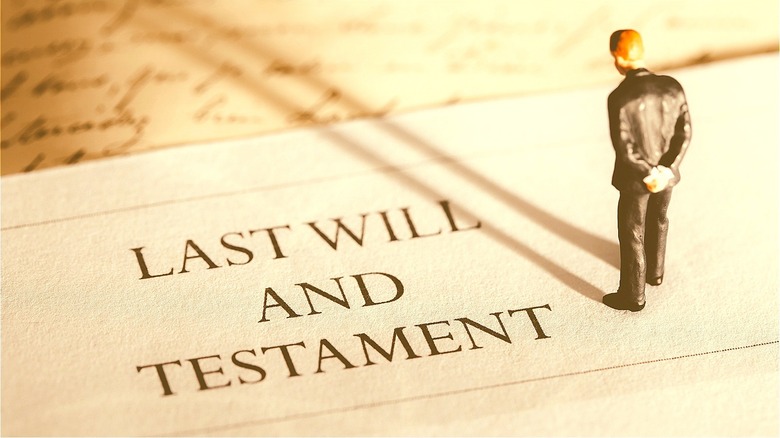Do You Need A Lawyer To Write A Will?
A stock situation of cartoons and comedies is a distraught character, convinced they're going to die, recruiting the help of a friend or a relative — who knows better, but who isn't a lawyer — to take down their last will and testament. Something like, "I, [Hypochondriac Comic Fool], being of sound mind and body, do hereby bequeath," and so on. Inevitably, they turn out to be fine, and in no real danger of passing on, and life continues with the will business put off for another day.
As with so many things, drafting a will in real life is a more sober task, and not nearly as likely the result of wacky misunderstandings as fiction would have you believe. It's also the kind of thing one might assume requires expert legal help, not whichever exasperated comrade you can convince to take dictation. A will is an opportunity to make your wishes known as to how your money, things, and personal affairs — including guardianship for any young children — will be handled after you're gone. When committed to a formal document, it requires legal speak. And in making out a will, it's wise to understand what it can't do (affect any assets not owned under your own name), and under what circumstances it might be superseded by other documents.
This said, you actually don't necessarily need a lawyer to talk you through writing a will. And you don't need to have a beleaguered friend write it for you either. There are estate planning services that will help you prepare your final will and testament; and, if you really want to go it alone, there are guides to help you write it yourself.
Estate planning services can help prepare a will
Resources, such as the National Council on Aging, do advise consulting a lawyer when writing a will, at least, in certain circumstances: having extensive, diverse, and complicated financial holdings, for instance, or difficult family dynamics likely to come into play after you die. (Here's what happens to your money if you die without a will.) But under more simple circumstances, where you can do without a lawyer, it may still be wise to seek help from an accountant or from an estate planning service. (Check out Money Digest's tips for choosing a financial adviser.)
Estate planning can be a welcome resource while you're alive and managing your money, but it's most often associated with wills. There are many estate planning services available, in offices and online; an online service will carry a fee for generating the relevant legal documents (or providing blank templates for you to fill out). Note, these services can't provide legal advice, though some will direct you to where you can get it, for an additional fee. Going with such a service, you'll want to have plans for your assets, plus a full accounting of your wealth and your debts, ready to go. But, estate planning can help simplify the process of pulling all this together to figure out your will.
You can write out a will on your own
In the United States, though there's variance by state, the requirements for making a will legal are fairly simple: The person whose will it is must be at least 18 years old and of sound mind, they must have signed it, and at least two witnesses 18 or older must sign it as well. You don't need to have the will notarized, you don't need your executor (that is, the person you designate to carry out your final wishes and to dispense with your outstanding debt) to sign off on it, and the will doesn't need to be recorded in a specific way: It can be digital or a hard copy on paper, though note some states won't accept a will written by hand, and others, like California, won't accept a digital-only version. That doesn't seem like too much to handle on your own, does it?
You're well within your rights to write out your will without any legal counsel or financial advice. Should you go down that road, you'll want to be sure of the specifics of your state's laws concerning wills. You'll also want to make sure you line up your witnesses, name a dependable executor, do your homework on taxes (for example, do you pay taxes on inheritance?), and be prepared to update your will as circumstances dictate throughout your life. If you do all that and feel ready to write it all up, you can pick up a pen and fill out a piece of paper for free, or you can use digital tools to fill out a will for varying prices.


